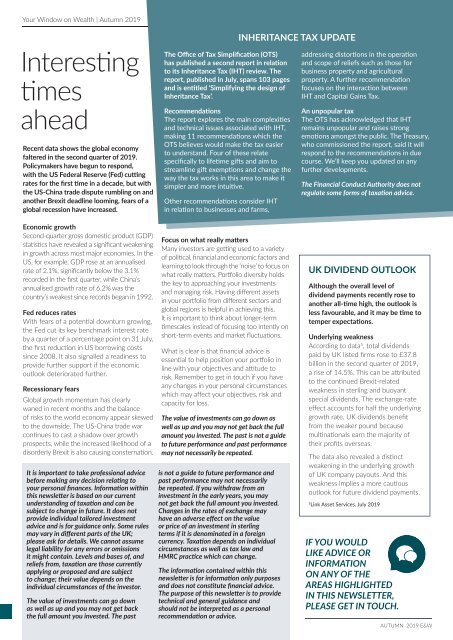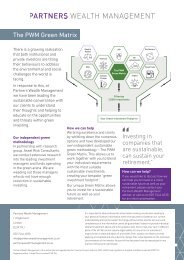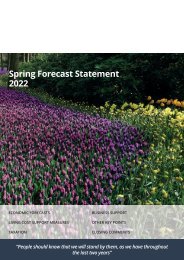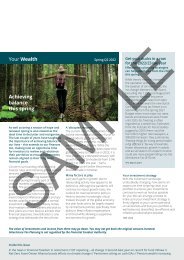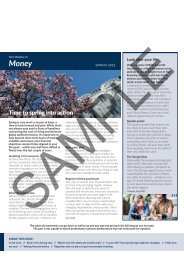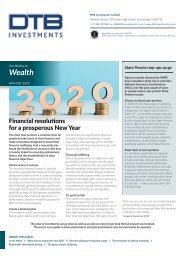Create successful ePaper yourself
Turn your PDF publications into a flip-book with our unique Google optimized e-Paper software.
Your Window on Wealth | <strong>Autumn</strong> 2019<br />
Interesting<br />
times<br />
ahead<br />
Recent data shows the global economy<br />
faltered in the second quarter of 2019.<br />
Policymakers have begun to respond,<br />
with the US Federal Reserve (Fed) cutting<br />
rates for the first time in a decade, but with<br />
the US-China trade dispute rumbling on and<br />
another Brexit deadline looming, fears of a<br />
global recession have increased.<br />
The Office of Tax Simplification (OTS)<br />
has published a second report in relation<br />
to its Inheritance Tax (IHT) review. The<br />
report, published in July, spans 103 pages<br />
and is entitled ‘Simplifying the design of<br />
Inheritance Tax’.<br />
Recommendations<br />
The report explores the main complexities<br />
and technical issues associated with IHT,<br />
making 11 recommendations which the<br />
OTS believes would make the tax easier<br />
to understand. Four of these relate<br />
specifically to lifetime gifts and aim to<br />
streamline gift exemptions and change the<br />
way the tax works in this area to make it<br />
simpler and more intuitive.<br />
Other recommendations consider IHT<br />
in relation to businesses and farms,<br />
INHERITANCE TAX UPDATE<br />
addressing distortions in the operation<br />
and scope of reliefs such as those for<br />
business property and agricultural<br />
property. A further recommendation<br />
focuses on the interaction between<br />
IHT and Capital Gains Tax.<br />
An unpopular tax<br />
The OTS has acknowledged that IHT<br />
remains unpopular and raises strong<br />
emotions amongst the public. The Treasury,<br />
who commissioned the report, said it will<br />
respond to the recommendations in due<br />
course. We’ll keep you updated on any<br />
further developments.<br />
The Financial Conduct Authority does not<br />
regulate some forms of taxation advice.<br />
Economic growth<br />
Second-quarter gross domestic product (GDP)<br />
statistics have revealed a significant weakening<br />
in growth across most major economies. In the<br />
US, for example, GDP rose at an annualised<br />
rate of 2.1%, significantly below the 3.1%<br />
recorded in the first quarter, while China’s<br />
annualised growth rate of 6.2% was the<br />
country’s weakest since records began in 1992.<br />
Fed reduces rates<br />
With fears of a potential downturn growing,<br />
the Fed cut its key benchmark interest rate<br />
by a quarter of a percentage point on 31 July,<br />
the first reduction in US borrowing costs<br />
since 2008. It also signalled a readiness to<br />
provide further support if the economic<br />
outlook deteriorated further.<br />
Recessionary fears<br />
Global growth momentum has clearly<br />
waned in recent months and the balance<br />
of risks to the world economy appear skewed<br />
to the downside. The US-China trade war<br />
continues to cast a shadow over growth<br />
prospects, while the increased likelihood of a<br />
disorderly Brexit is also causing consternation.<br />
It is important to take professional advice<br />
before making any decision relating to<br />
your personal finances. Information within<br />
this <strong>newsletter</strong> is based on our current<br />
understanding of taxation and can be<br />
subject to change in future. It does not<br />
provide individual tailored investment<br />
advice and is for guidance only. Some rules<br />
may vary in different parts of the UK;<br />
please ask for details. We cannot assume<br />
legal liability for any errors or omissions<br />
it might contain. Levels and bases of, and<br />
reliefs from, taxation are those currently<br />
applying or proposed and are subject<br />
to change; their value depends on the<br />
individual circumstances of the investor.<br />
The value of investments can go down<br />
4<br />
as well as up and you may not get back<br />
the full amount you invested. The past<br />
Focus on what really matters<br />
Many investors are getting used to a variety<br />
of political, financial and economic factors and<br />
learning to look through the ‘noise’ to focus on<br />
what really matters. Portfolio diversity holds<br />
the key to approaching your investments<br />
and managing risk. Having different assets<br />
in your portfolio from different sectors and<br />
global regions is helpful in achieving this.<br />
It is important to think about longer-term<br />
timescales instead of focusing too intently on<br />
short-term events and market fluctuations.<br />
What is clear is that financial advice is<br />
essential to help position your portfolio in<br />
line with your objectives and attitude to<br />
risk. Remember to get in touch if you have<br />
any changes in your personal circumstances<br />
which may affect your objectives, risk and<br />
capacity for loss.<br />
The value of investments can go down as<br />
well as up and you may not get back the full<br />
amount you invested. The past is not a guide<br />
to future performance and past performance<br />
may not necessarily be repeated.<br />
is not a guide to future performance and<br />
past performance may not necessarily<br />
be repeated. If you withdraw from an<br />
investment in the early years, you may<br />
not get back the full amount you invested.<br />
Changes in the rates of exchange may<br />
have an adverse effect on the value<br />
or price of an investment in sterling<br />
terms if it is denominated in a foreign<br />
currency. Taxation depends on individual<br />
circumstances as well as tax law and<br />
HMRC practice which can change.<br />
The information contained within this<br />
<strong>newsletter</strong> is for information only purposes<br />
and does not constitute financial advice.<br />
The purpose of this <strong>newsletter</strong> is to provide<br />
technical and general guidance and<br />
should not be interpreted as a personal<br />
recommendation or advice.<br />
UK DIVIDEND OUTLOOK<br />
Although the overall level of<br />
dividend payments recently rose to<br />
another all-time high, the outlook is<br />
less favourable, and it may be time to<br />
temper expectations.<br />
Underlying weakness<br />
According to data 5 , total dividends<br />
paid by UK listed firms rose to £37.8<br />
billion in the second quarter of 2019,<br />
a rise of 14.5%. This can be attributed<br />
to the continued Brexit-related<br />
weakness in sterling and buoyant<br />
special dividends. The exchange-rate<br />
effect accounts for half the underlying<br />
growth rate. UK dividends benefit<br />
from the weaker pound because<br />
multinationals earn the majority of<br />
their profits overseas.<br />
The data also revealed a distinct<br />
weakening in the underlying growth<br />
of UK company payouts. And this<br />
weakness implies a more cautious<br />
outlook for future dividend payments.<br />
5<br />
Link Asset Services, July 2019<br />
IF YOU WOULD<br />
LIKE ADVICE OR<br />
INFORMATION<br />
ON ANY OF THE<br />
AREAS HIGHLIGHTED<br />
IN THIS NEWSLETTER,<br />
PLEASE GET IN TOUCH.<br />
AUTUMN 2019 E&W


